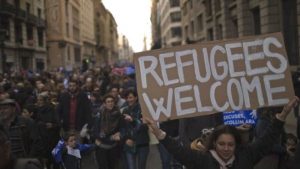‘Subversive’ cities put out the welcome mat for refugees
As public policy at national levels in many countries in Europe and the US turns away from welcoming refugees and migrants, cities are forging more open, inclusive and equitable policies.
As national debates on immigration turn toxic, local governments are implementing proactive policies on integration.
Ranging from protest or even outright defiance to national edicts to innovative programs to promote integration, efforts at the local level are gaining momentum.
 Last month, more than 160,000 protesters marched in the streets of Barcelona in response to the Spanish Government’s inaction on the refugee crisis.
Last month, more than 160,000 protesters marched in the streets of Barcelona in response to the Spanish Government’s inaction on the refugee crisis.
Despite committing to take in more than 17,000 refugees by September 2017, Spain has only taken in around 1,100 refugees.
The Barcelona march included the city’s mayor, more than 100 mayors of other cities and 900 civil society organisations.
The march was in support ‘Casa nostra, casa vostra’ (Our home, your home) platform in demanding that the national government take in refugees and allow cities and regions to fulfil commitments and duties in accommodating them.
In Germany, several centre-left governed states are refusing to deport people whose asylum claims have been denied back to Afghanistan, in defiance of orders from the Interior Ministry.
The German government has made the increase in deportations and returns a key priority ahead of the national elections in September, but the five state governments, or Länder, argue that Afghanistan cannot provide a safe environment for people sent back there.
In North America, dozens of cities – from Austin, Texas to Montreal, Canada – are joining a long list of self-declared ‘sanctuary cities’ which are defying federal edicts to deport unauthorised migrants.
The cities are refusing to allow their local police to collaborate with federal law enforcement authorities.
In response, the Trump administration has threatened to block federal funding for these cities.
Along with simply defying national policies, many cities and towns are also leading the way with innovative programs that are helping to welcome and integrate a growing number of migrants and refugees.
Last year’s World Mayor Prize was just awarded to the mayor of Mechelen in Belgium for the city’s successful integration policies in one of Europe’s most diverse cities.
Also shortlisted was the mayor of the Polish city of Gdansk, who – in a nation that is not welcoming to almost any type of migrants, immigrants, or refugees – set up a pioneering Council of Immigrants to advise the mayor and city administration as part of an effort to support integration and make immigrants feel welcome.
With the roll out of the Trump administration’s deportation efforts, and upcoming national elections in the Netherlands, France, and Germany, the migration debate is gathering steam.
The voices of cities and local governments are becoming more important as advocates for open and inclusive societies.
In most of these countries it is the cities who actually provide the safe communities and successful integration models that will make or break national migration policies.
Laurie Nowell
AMES Australia Senior Journalist












